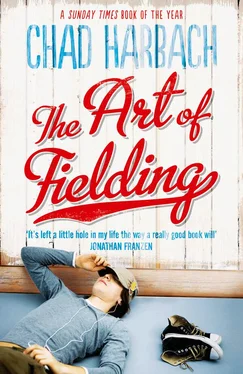The next day, their last in Florida, Henry started at shortstop and Tennant moved to third. Instead of bitter or angry, Tennant seemed relieved. When Henry struck out, as he did too often — his hitting was nowhere near as good as his defense — Tennant cuffed him on the helmet and told him to hang in there. They won the game, and though a 2 and 9 Florida trip wasn’t great, an odd kind of optimism was creeping in.
After his freshperson year ended, Henry stayed at Westish to train with Schwartz. They met at five thirty every morning. When Henry could run up and down all the stairs in the football stadium without stopping, Schwartz bought him a weighted vest. When he could run five seven-minute miles, Schwartz made him do it on the sand. When he could do it on the sand, Schwartz made him do it with lake water lapping at his knees. Medicine balls, blocking sleds, yoga, bicycles, ropes, tree branches, steel trash cans, plyometrics — no implements or ideas were too mundane or exotic. At seven thirty, the sun still low over the lake, Henry showered and headed to the dining hall to wash breakfast dishes for the summer-school kids. After his shift he walked to Westish Field, where Schwartz set up the pitching machine and the video camera. Henry hit ball after ball until he could hardly lift his arms. Then they went to the VAC to lift weights. In the evenings they played on a summer team in Appleton.
Henry had never felt so happy. Freshperson year had been one thing, an adventure, an exhilaration, all in all a success, but it had also been exhausting, a constant struggle and adjustment and tumult. Now he was locked in. Every day that summer had the same framework, the alarm at the same time, meals and workouts and shifts and SuperBoost at the same times, over and over, and it was that sameness, that repetition, that gave life meaning. He savored the tiny variations, the incremental improvements — tuna fish on his salad instead of turkey; two extra reps on the bench press. Every move he made had purpose. While they worked out, Schwartz would recite lines from his favorite philosophers, Marcus Aurelius and Epictetus — they were Schwartz’s personal Aparicios — and Henry felt that he understood. Every day is a war. Yes, yes it was. The key is to keep company only with people who uplift you, whose presence calls forth your best. Done: there was only one of those. He was becoming a baseball player.
By the time his sophomore season began Henry had gained twelve pounds. He was still one of the smaller guys on the team, but the bat felt different in his hands, lighter and more lively. He batted .348 and was named the first-team Upper Midwestern Small Colleges Athletic Conference shortstop. In thirty-one games he didn’t make a single error. He was still shy in class and around campus — he never went to the bars and rarely to parties; there was too much work to do — but among his teammates he flourished. He loved those guys and felt good in their midst, and now that he was undisputedly the best player on the team, he became something of a leader. He wasn’t loud like Schwartz, but everyone listened when he spoke. The Harpooners finished .500 for the first time in a decade.
That summer, inspirited by success, he worked even harder. Instead of five thirty, he got up at five. Instead of five meals a day, he ate six. His mind felt clear and pure. The ball rocketed off his bat. He was coming to understand certain parts of The Art of Fielding in a new way, from the inside out, as if the great Aparicio were less an oracle than an equal.
He acquired a protégé too — Izzy Avila, a player Schwartz had recruited from his old neighborhood in South Chicago. Schwartz loved Westish, and he both loved and hated where he came from, and he wanted to help guys get from one to the other. Izzy was a perfect candidate, a gifted athlete and decent student who nonetheless needed the help. His two older brothers had also been gifted athletes — now one lived with their mom and the other was in prison. “He’s a little raw,” Schwartz said. “He can ride the bench this year, learn some things. Then play second next year after Ajay graduates. Then when you’re gone, he’s the new shortstop.”
Izzy feared and respected Schwartz, but he worshipped Henry. When they took their daily ground balls, he tried to copy Henry’s every move. When Henry talked about the subtleties of infield positioning, Izzy, unlike the other Harpooners, understood. When he didn’t understand, he studied until he did. They worked relays, rundowns, bunts, feints, pickoffs, double plays. Henry bought him a copy of The Art of Fielding for his birthday.
But Izzy wasn’t ready, mentally or physically, for Henry’s toughest workouts. Henry trained speed with Starblind, the fastest guy on the team. He trained strength with Schwartz, the strongest. When those guys went home, he went to yoga class with Owen. Then he trained some more. He fielded grounders in his mind until he fell asleep. He got up at five and did it again.
By the start of his junior season, he’d become something Westish College had never seen: a prospect. He hit a home run in the second game of the Florida trip, another in the fourth game, a third in the sixth. By then the scouts were loitering in their Ray-Bans behind the backstop. Fans showed up too, local baseball lovers who’d heard about the must-see kid with the magic glove. By week’s end the team was 10 and 2, Henry was hitting .519, and he’d moved within a single game of tying Aparicio Rodriguez’s NCAA record for most consecutive errorless games. The flight back to Wisconsin was one long celebration.
Chapter 6
In the spring of 1880, Herman Melville, then sixty years old, was working as a customs inspector at the Port of New York, having proved unable to support his family through literary work. He was not famous and earned almost nothing from royalties. His first-born son, Malcolm, had committed suicide thirteen years earlier. Melville’s in-laws, among others, feared for his health and regarded him as insane. On a national scale, the horrific, bloody rift he’d prophesied in Moby-Dick and Benito Cereno (both long out of print in 1880) had come to pass, and, as he had been perhaps the first to foresee, the anguish had not ceased with the end of the war.
Not surprising, then, that the great writer might have found himself growing grim about the mouth, as his best-known protagonist put it; that he might have deemed it high time to get back to sea. Too old, impecunious, and hemmed in by family matters to make any more ocean crossings, Melville settled upon a more modest adventure. The spring thaw came early that year, and in March he boarded a ship headed up the Erie Canal, to tour the Great Lakes and thereby reprise alone a trip he had taken with his friend Eli Fly forty years before. Scholars have made much of Melville’s pilgrimage to Jerusalem (1856—57), but this later domestic voyage went unmentioned until 1969, when an undergraduate at Westish College — a small, venerable but already in those days slightly decrepit liberal arts school on the western shore of Lake Michigan — made a remarkable discovery.
The undergraduate’s name was Guert Affenlight. He was not, at the time, a student of literature. Rather, he was a biology major and the starting quarterback for the Westish Sugar Maples. He had grown up in the undulant, plainsy part of the state, south and west of Madison, the fourth and by far the youngest son of small-time dairy farmers. He’d been accepted to Westish in part to play football, and though the school, then as now, did not offer athletic scholarships, he was rewarded for his gridiron toils with a cushy job in the college library. Officially he was supposed to shelve books for twelve hours a week, but it was understood that the bulk of that time could be spent studying.
Читать дальше










